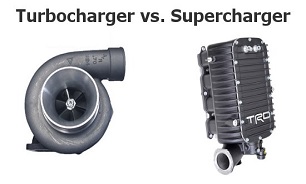There are two relatively simple options to boost (pun intended) horsepower in a vehicle: superchargers and turbochargers. But, which is better? Once again, Jason Fenske of Engineering Explained is here with an answer.

Khodrocar - It's important to understand how both options function first. A turbocharger relies on a vehicle's exhaust to spool up a turbine to power a compressor. The compressor then pulls in and feeds more air to an engine. On the other hand, a supercharger depends on the engine to rotate. It can be gear driven or belt driven, but the engine powers the unit in the end.
From an efficiency standpoint, the turbocharger has an advantage. It takes wasted exhaust and turns it into something useful. Meanwhile, a supercharger won't do this and acts more like a naturally aspirated engine.
However, with a turbocharger comes lag. A supercharger doesn't rely on exhaust gas and power comes immediately. Superchargers can more easily be tuned to provide linear boost across the rpm range as well. Other downsides to a turbocharger include a lubrication requirement. A turbo requires engine oil lubrication, which is another demand on the engine. And as the turbo creates more heat, the oil will degrade quicker. For the record, some superchargers require engine oil lubrication as well, but it will never reach the more extreme temperatures that a turbo will.
This isn't to say a supercharger is perfect. A supercharger is literally taking power from the engine itself to make more power. Of course, the driver gains the power back, but it's not a very efficient process.
What's Jason's take? He once believed turbochargers were the better option, but now, he believes superchargers are supreme. In this case, it comes down to pedal response. With a supercharger, giving the throttle 50 percent will return 50 percent. A turbocharged car may be more variable as power builds up.
From an efficiency standpoint, the turbocharger has an advantage. It takes wasted exhaust and turns it into something useful. Meanwhile, a supercharger won't do this and acts more like a naturally aspirated engine.
However, with a turbocharger comes lag. A supercharger doesn't rely on exhaust gas and power comes immediately. Superchargers can more easily be tuned to provide linear boost across the rpm range as well. Other downsides to a turbocharger include a lubrication requirement. A turbo requires engine oil lubrication, which is another demand on the engine. And as the turbo creates more heat, the oil will degrade quicker. For the record, some superchargers require engine oil lubrication as well, but it will never reach the more extreme temperatures that a turbo will.
This isn't to say a supercharger is perfect. A supercharger is literally taking power from the engine itself to make more power. Of course, the driver gains the power back, but it's not a very efficient process.
What's Jason's take? He once believed turbochargers were the better option, but now, he believes superchargers are supreme. In this case, it comes down to pedal response. With a supercharger, giving the throttle 50 percent will return 50 percent. A turbocharged car may be more variable as power builds up.
Latest News


